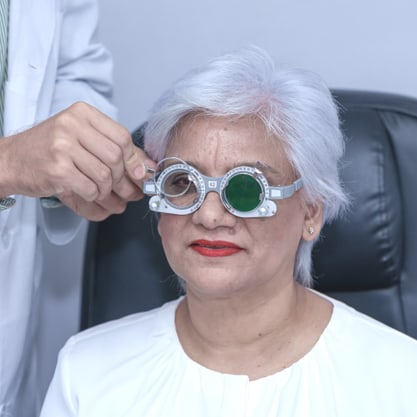If a loved one mentions that a condition runs in your family, it’s natural to be concerned. Simply put, if a health condition has strong genetic links, specific genes inherited from your parents can make you more susceptible to developing that condition.
Glaucoma is a group of eye diseases that damages the optic nerve, gradually leading to vision loss. A person with a close family history of glaucoma is 4 to 9 times more likely to develop this condition than someone without one.
A family history of glaucoma doesn’t necessarily mean you’ll develop it. However, it makes early detection through routine eye exams and frequent glaucoma testing all the more essential to preserve your vision and eye health.
The Role of Genetics in Glaucoma Development
Glaucoma is an example of a condition that has strong genetic links. Studies have shown that glaucoma often clusters within families.
If a close relative (like a parent or sibling) has glaucoma, your risk of developing it can be 4 to 9 times higher than someone without a family history. This is especially true for primary open-angle glaucoma, which is glaucoma’s most common variety:
Specific gene mutations and markers have been associated with glaucoma, such as:
- Primary open-angle glaucoma: Specific gene mutations, such as those in the MYOC and OPTN genes, influence susceptibility. These variations can affect the eye’s drainage system, leading to high eye pressure over time.
- Angle-closure glaucoma: This is sometimes linked to inherited anatomical traits, such as a narrower angle in the eye, which can predispose certain people to this condition.
- Congenital glaucoma: This type of glaucoma is present at birth, often resulting from mutations in genes like CYP1B1, which are critical for eye development.
However, genetics isn’t an absolute predictor. Environmental factors and lifestyle choices often interact with your genetic predisposition to determine whether the condition ultimately develops.
Other Risk Factors to Consider
Although family history can play a substantial role in your risk of developing glaucoma, it’s not the only determinant.
Even if you don’t have a family history, a range of other factors can also contribute to your chances of developing this condition, such as:
- Age: People over the age of 60 are at higher risk, especially for certain types like primary open-angle glaucoma.
- Ethnicity: African, Hispanic, and Asian populations have increased susceptibility to certain types of glaucoma.
- High eye pressure: Elevated pressure within the eye is one of the most significant risk factors, as it can damage the optic nerve.
- Thin corneas: Thinner central corneas can contribute to a higher glaucoma risk.
- Chronic eye conditions: Conditions like high myopia or eye injuries can raise your risk level.
- Health conditions: Diabetes, high blood pressure, and poor circulation have been linked to increased glaucoma risk.
- Medications: Long-term use of corticosteroids, especially eye drops, may elevate risk.
A family history of glaucoma combined with one of these additional risk factors, such as high myopia, still doesn’t mean developing this condition is inevitable.
Think of these risks as puzzle pieces, not the whole picture. Your lifestyle, environmental factors, and, most importantly, proactive eye care can all help tip the scales in your favor.
Identifying your risk level and committing to regular eye exams and frequent glaucoma workups allows your eye doctor to identify glaucoma early or slow its progression.

Why Early Detection Matters
One of glaucoma’s most concerning aspects is how it develops silently, damaging your optic nerve over time without exhibiting noticeable symptoms. In fact, the onset of symptoms often signals that the condition may have already progressed significantly.
The optic nerve acts as a bridge, transmitting visual information from the retina to the brain, allowing us to perceive our surroundings. Glaucoma damages the optic nerve, disrupting the flow of visual signals, and creating blind spots in your field of vision.
This underscores the importance of routine eye exams and frequent glaucoma workups, especially if you have a family history.
Catching glaucoma in its early stages allows your eye doctor to implement treatments to slow its progression and minimize further damage. Leaving glaucoma unmanaged lets the damage continue, leading to significant vision loss and, in severe cases, complete blindness.
Although there is currently no definitive treatment for glaucoma and no way to reverse the associated vision loss due to the disease, there are medical advancements continuously being made in the industry. Thanks to new medical research, there are options to properly manage and slow down the progression of glaucoma.
Glaucoma Management
Breakthroughs in research mean there are effective options for glaucoma management. Management involves a holistic approach, through medical interventions, lifestyle adjustments, and regular communication with your eye doctor.
Here are some key approaches to managing glaucoma:
- Medicated eye drops: These daily drops reduce pressure within the eye by decreasing fluid production or improving drainage.
- Laser treatments: Procedures like trabeculoplasty or iridotomy can enhance fluid drainage or create new pathways for fluid to exit the eye. These treatments are often used alongside medicated eye drops.
- Surgical procedures: Techniques like trabeculectomy or glaucoma drainage implants create alternative drainage channels to lower eye pressure. This is typically recommended for advanced cases or when other treatments aren’t enough.
Choosing the right treatment approach depends on the type and stage of glaucoma, as well as your overall health and family history. It’s a collaborative effort requiring dedication from your eye care team and your active commitment.
Prioritize Your Vision
Although genetics can increase your risk of developing glaucoma, it doesn’t determine your fate.
If glaucoma runs in your family, don’t wait for symptoms to appear. Early detection allows for timely management, helping to preserve your vision and eye health.
Connect with our Sage Eyecare team to schedule a routine eye exam or talk with your eye doctor about advanced glaucoma testing.

























